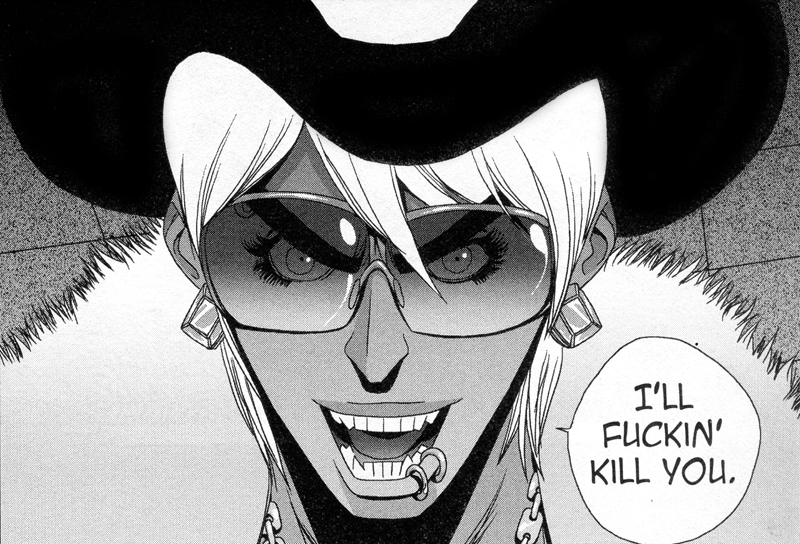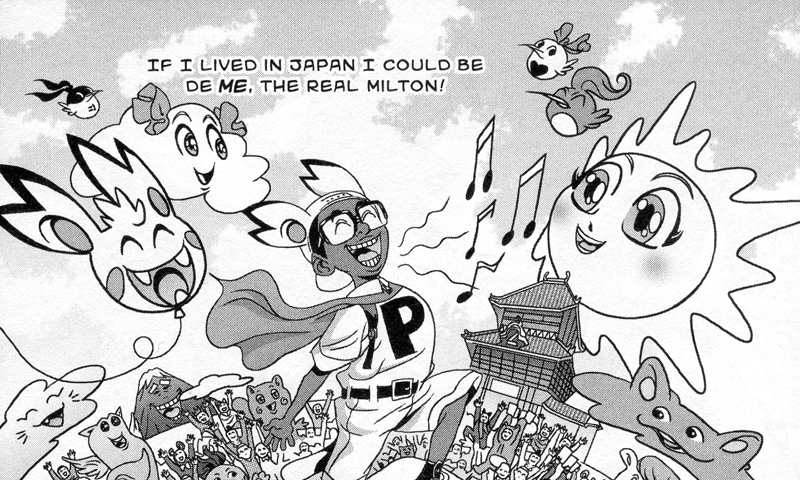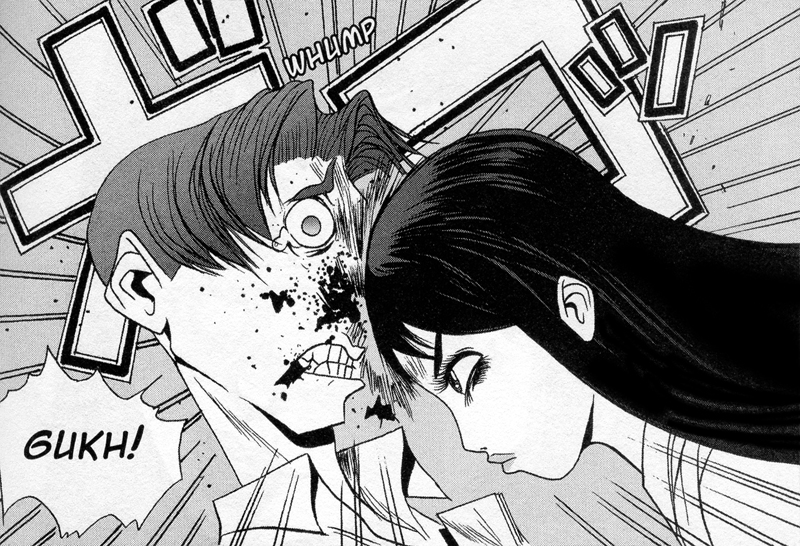Peepo Choo is an irreverent, cruel, and utterly tasteless work that derives great pleasure in upsetting the delicate sensibilities of comics fans from both sides of the Pacific. It's closer to the acerbic Welcome to the N.H.K. than to the gentle Genshiken. The book is also chock full of gratuitous scenes of extreme violence and sexual promiscuity. Frankly, its intemperance is rather entertaining, at least to me.
This is partly due to the unusual status of its creator Felipe Smith as one of a few foreigners who have established a toehold in Japan's manga industry. Smith possesses the jaundiced perspective of someone who has experienced genuine culture shock from having to live abroad and navigate between the customs of more than one country. Peepo Choo was originally written for the Japanese market. But unlike most manga, its message could also be read as being deliberately aimed at Smith's fellow Americans. In some ways it is a very personal form of expression about personal identity. But it's an identity largely mediated through popular forms of entertainment that inform, distort, and limit an individual. And it's about how the growing cross-fertilization between heterogeneous media entities often leads to more misunderstanding, mainly because they can often leave a false (or incomplete) impression of their respective cultures. Smith is relentless and wide-ranging in his attack, and he's probably biting off far more than he can chew. I suspect that to many readers, his need to constantly unsettle them with hyperbolic displays of the outlandish and repulsive will be off-putting, as well as a distraction from the point he's trying to make. For others, Peepo Choo just might hit a little too close to home. And then there are those who will dismiss it out of hand as not being real "manga". But his voice is a unique amongst America's younger manga-inspired creators, and his no-holds-barred approach is refreshing, even if it's flawed.
Then there's the art, which breaks free of the conventions of shonen and shojo. According to Jason Thompson, Smith was influenced by seinen mangaka Tatsuya Egawa. I can begin to see that in Smith's caricature, his use of manic facial expressions and body language, realistic body proportions, and his predilection for drawing curvaceous women. This is a darker, more sardonic kind of manga that few English-language readers usually see. Peepo Choo is as much a showcase for Smith's formidable draftsmanship as it is his takedown of pop culture. The story and its varied cast wouldn't be as effective except for his artistic talents: whether its trashing the inherent homoeroticism of American superheroes and the kawaii aesthetic of Japanese anime in equal measure, parodying the the gore of slasher flicks, the sweat-drenched sex of porn videos, the gun-totting morality of gangster films, or just rendering the actual streets of Chicago and Tokyo. Smith gleefully switches from the cute to the grotesque, or from the minimal to the highly detailed. He bends and twists the plot to breaking point in order to accommodate whatever it is he wishes to draw. But the art-shifts also serve to highlight the contrasting personalities and inner worlds of his various cast members.
The plot itself is nothing more than an excuse for the worlds of America and Japan to collide into one another, in the most colorful way possible. At least that's the setup for this volume. Three Americans inexplicably accompany each other on a trip to Japan: Gill runs a comic book store, which is a cover for his real job - a hulking assassin who finds sexual enjoyment in his work. Store clerk Jody looks down on his largely asexual customers while claiming to be a player, even though he's actually a virgin. And then there's Milton, a kid who puts on a tough-looking facade to hide the fact that he's an otaku and a fan of the bizarro anime series "Peepo Choo". They're mirrored by a similarly eccentric Japanese cast: Takeshi Morimoto is a yakuza enforcer who idolizes gangsta rap and hip hop. He's seemingly unaware that this obsession, not to mention his sociopathy, has already alienated his girlfriend and colleagues. And there's Reiko Kawamori, a teenage gravure idol who despises her pervy fans, and whose only "friend" is the school's most unpopular girl - naturally, she's an otaku. The international meet-ups are only getting started by the end of volume one. But if what's happened so far is any indication for volume two, expect the inevitable culture-clash to be monumentally ego-crushing, and possibly life-ending for some. Of this crew of misfits, the two who come closest to being sympathetic are Reiko and Milton. Reiko seems to be fed up with the sexism she encounters on a daily basis. Milton embodies the dashed hopes of American otaku, and perhaps of Smith's as well, who've come to realize that the Japan of their imaginations doesn't line-up with reality. After he notices that his cosplaying is earning stares from Tokyo's residents, Milton thinks "I know this feeling too well. I just never thought I’d feel it in Tokyo. There's hostility in the air."
Reading Peepo Choo is a provocative, but taxing experience. Smith's satire isn't exactly subtle (Yes, yes, fans are delusional weebos. Thanks for clearing that up!). And I have my doubts as to whether Smith's need to top himself with progressively shocking imagery will lead to something fruitful in the end. But I'm in for now. The monstrous reflection it presents to the industry is fascinating, and I'm curious to see just how far Smith can take it. He's done well to capture those feelings of vertigo and alienation often experienced in our media-saturated world. It isn't often that such of-kilter manga makes it to the shelves of local bookstores.




